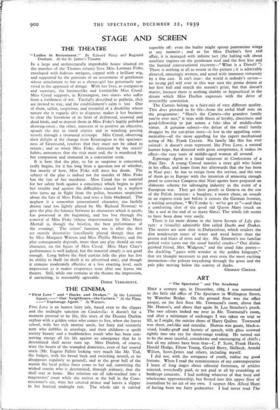THE CINEMA
" First Love " and " Ducks and Drakes." At the Leicester Square.—" Our Neighbours—the Carters." At the Plaza. " Espionage Agent." At Warners.
First Love is an honest fairy tale, based even to the slipper and the midnight sanction on Cinderella: it doesn't for a moment pretend to be life, this story of the Deanna Durbin orphan with a golden voice who comes to live, when she leaves school, with her rich morose uncle, her hazy and eccentric aunt who dabbles in astrology, and their children—a spoilt society beauty and a backboneless youth who has been con- serving energy all his life against an emergency that he is determined shall never turn up. Miss Durbin, of course, wins the hearts of the trampled domestics, even of her soured uncle (Mr. Eugene Pallett looking very much like Mr. Tod, the badger, with his broad back and twitching nostril, as he disappears regularly to ground), and at the great ball of the season the local police force come to her aid, outwitting the wicked cousin who is determined, through jealousy, that she shall stay at home. Her relatives are all side-tracked into a magistrates' court while she arrives at the ball in the Com- missioner's car, wins her coveted prince and leaves a slipper in her hurried midnight exit. The whole tale is carried superbly off : even the butler might sprout pantomime wings at any moment ; and as for Miss Durbin's first real affair, it is managed with infinite tact (the halting talk about auxiliary engines on the penthouse roof and the first kiss and the hurried conversational recovery—" What is a Diesel? "). There is nothing at all to resent in the picture ; it is admirably directed, amusingly written, and acted with immense virtuosity by a fine cast. It isn't true: the world is nobody's oyster— no young girl will ever in this way oust the prima donna at her first ball and snatch the season's prize, but that doesn't matter, because there is nothing shabby or hypocritical in the dream which Miss Durbin expresses with the drive of irresistible conviction.
The Carters belong to a fairy-tale of very different quality. This does pretend to be life—from the awful bluff note on the programme : " Here's the Carters—the grandest family you've ever met," it tries with blasts of loyalty, cheeriness and good-fellowship to put across a fake idea of middle-class virtue. A genuine*, subject—the defeat of the small family druggist by the cut-price store—is lost in the appalling senti- mentality—all the more appalling for the expert mechanised acting of Mr. Frank Craven. No family like this has ever existed : it doesn't even represent, like First Love, a natural human hope, but directed with great competence, it makes its effect—the easy tears of middle-aged women all around.
Espionage Agent is a timid successor to Confessions of a Nazi Spy. A young Consul marries a stray girl who faints in his office, and hears from her afterwards that she has been in Nazi pay : he has to resign from the service, and the two of them go to Europe with the intention of amassing enough proof to convince Congress that Nazi agents have prepared an elaborate scheme for sabotaging industry in the event of a European war. They get their proofs in Geneva on the eve of the Polish invasion: a burglary, a motor chase, an assault in an express train just before it crosses the German frontier, a waiting aeroplane, " We'll make it : we've got to "—and then a comforting shot of the good old Queen Mary (stuck on like a seal at the end of so many films). The whole job seems to have been done very easily.
There is far more drama in the latest Secrets of Life pic- ture : a (visually) admirable film called Ducks and Drakes. The secrets are now shot in .Dufaycolour, which renders the dim nondescript tones of water and weed better than the greens and blues of trees and sky. Mr. Emmett's too familiar potted voice turns out the usual hateful cracks—" Our distin- guished friend, Mrs. Widgeon," and the usual fake poetry— the duckling " gazes with wonder at the golden kingcups," that are thought necessary to put over even the most exciting instruction—the polecat torpedoing through the grass and the pale pike moving below the convoy of ducks.
GRAHAM GREENE.




































 Previous page
Previous page